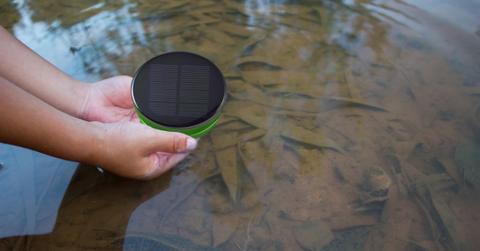This Sustainable Mosquito Trap Acts Like A Bug-Eating Plant
This solar-powered mosquito trap from Cornell is modeled on a carnivorous plant.
Updated May 31 2019, 12:22 p.m. ET

Nothing ruins a summer night quite like a hungry mosquito. One minute you’re enjoying grilled peaches with your friends and the next, you’re swatting and scratching the itchy new bumps on your arm.
But mosquitoes aren’t just annoying — they can pose serious health risks, too, as carriers of malaria and the Zika and West Nile viruses. It’s essential to ward off these bugs, though no one can agree on the best way to handle them. Netting and screens? Bug sprays? Citronella candles?
Researchers at Cornell are putting forth a new solution called the UPod. This “mosquito control device” is a round disc that draws power from the sun and functions like a carnivorous plant.
The UPod is modeled on the Utricularia vulgaris, an aquatic bladderwort plant that floats along the water, sucking up fleas and other small prey through its bladder. Similarly, the UPod draws mosquito larvae into a water chamber through a trap door — except this mosquito eater has slightly higher tech. The device uses a smart sensor mechanism to control the chamber door, and the entire UPod relies on solar power to function.
Once the mosquito larvae are in the water chamber, it seals up and suffocates the bugs. The dead larvae are then flushed out, so that larvae can be pulled in.
The UPod earned the Cornell team of ecologists a prize at the Biomimicry Institute’s Global Design Challenge, a global innovation contest that seeks solutions to climate change inspired by nature.
“In the scoping process of our project development, we identified the expansion of mosquito-borne illnesses as a global human health problem related to climate change,” the team says in a statement. “Through our research we were able to find out that most of the mosquito control was in the form of vaccines or costly medicine, insecticides, fumigation, awning screens and others, but realized many people do not have access to these options and that these represent only short-term solutions.”
The researchers were responding to the link between climate change and mosquito-borne illness. Scientists have found that higher temperatures and rainfall can lead to an increase in malaria in some parts of the world, since these conditions can help mosquitos live longer and transmit disease at higher rates.
“Deaths due to mosquito-borne diseases and millions of dollars spent every year on costly medicine and mitigation practices provided the justification for the significance of this problem — we are really seeking to target the problem from the root cause,” the team explains in the statement.
The researchers designed the UPod with sustainability and affordability in mind. They envision it as an eco-friendly solution that individuals or communities could purchase to control mosquito larvae populations, curbing the spread of disease before it even starts.
After winning one of the eight prizes at the Biomimicry Institute’s Global Design Challenge, the team will now advance to the Biomimicry Launchpad, an accelerator program that helps bring nature-inspired solutions to market. The Cornell team could win $100,000 to develop the UPod into a commercial product.
By the researchers’ estimation, the UPod could be introduced to a variety of settings, including large puddles, stagnant ponds, and open drainage ditches. Considering its self-sufficient design, users could theoretically place the UPod in water and leave it to work, enjoying a healthier, safer environment for very little money or effort.